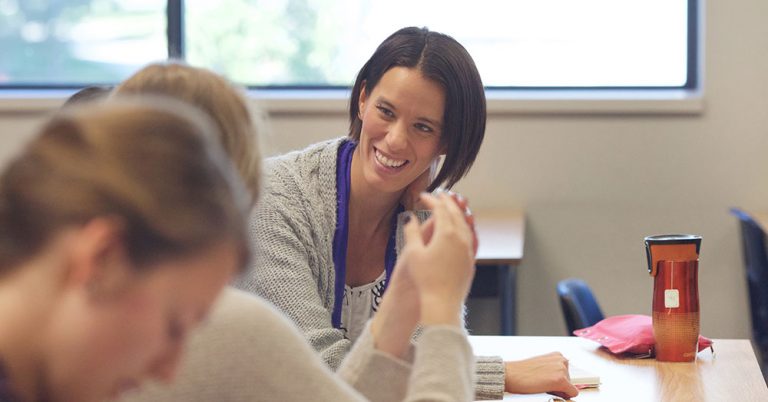Lindsay Diehl completed her doctoral degree in the summer of 2018, and until this fall, she was teaching first year English in the Department of English and Cultural studies. She was recently awarded the W.P. Bell Postdoctoral Fellowship at Mount Allison University, and has moved across the country to continue her academic career.
As the WP Bell Postdoctoral Fellow, she will teach in Mount Allison’s academic program in Canadian Studies. She will also be involved in the Centre for Canadian Studies, planning special guest speakers and events that contribute to the Centre’s outreach, scholarship, and co-curricular efforts.
Her research continues to look at topics in Asian Canadian Studies. She is working on an introductory volume on Asian Canadian Literature for a Routledge series on Canadian Studies, which is edited by Lorraine York and Robert Lecker. Additionally, she is planning a second creative-critical project, entitled Reading Outside of the Frame: Commemorative Projects on Early Chinese Canadian Women, which examines commemorative and familial accounts of early Chinese Canadian female experience.

Lindsay Diehl working with students
We talked to Lindsay to find out a bit more about her research and the road to earning her degree.
Tell us about the road to earning your UBC degree.
The interdisciplinary nature of UBC-O’s PhD is unique, and it allowed me the creativity and freedom to explore ways of productively merging my interests in creative writing and critical scholarship.
I would particularly like to thank my supervisor, Dan Keyes, for always believing in my imagining of a creative-critical project. He was constantly available to provide feedback, guidance, and encouragement; since the completion of my PhD, he has also written several letters to support my various applications, and he unswervingly emphasizes the innovation and value of my creative-critical approach to research.
Are there any professors that stand out as having made a difference to you and helped you along the way?
Dr. George Grinnell has been a generous and supportive mentor. For most of my PhD, he was my GTA supervisor when I was working in the English department. Through his engaging lectures and understanding demeanor, he provided me with a valuable role model. Indeed, from him, I learned productive ways of planning a course, running a classroom, encouraging participation, and communicating with students. Beyond his role as my GTA supervisor, George has always offered me invaluable research/writing/professional guidance, helping me to navigate not only the completion of my PhD, but also, more recently, the submission of my book proposals and postdoctoral applications. Whenever I write George with questions about how to advance my academic career, he consistently responds with detailed and useful tips; he has been a reliable and trusted mentor, helping me to plan my future and understand the next steps.
Were there any campus resources that contributed to your experience?
The Centre for Scholarly Communication (CSC) is an amazing resource, which all graduate students should take advantage of. The CSC runs several graduate workshops on how to write SSHRC applications, prepare CVs, get published, come up with a writing schedule, etc. In addition to these workshops, it also allows graduate students to meet with CSC advisors in weekly one-on-one sessions.
My meetings with Amanda Brobbel, the CSC coordinator, were crucial to my success as a PhD student. She helped me to edit articles for their submission to peer-review journals, as well as devise workable schedules to keep my dissertation-writing on track. Indeed, she kept me “progressing” on my dissertation chapters, instead of “obsessing” over each line and paragraph. My meetings with Amanda kept me accountable (i.e. I would set goals with her, and by the next meeting I wanted to show her that I had met those goals), and ultimately she helped me to stay motivated throughout the long, grueling process of writing a dissertation.
How did your UBC experience prepare you for the fellowship?
During my PhD, I received the Doctoral Teaching Scholarship, which served to develop my instructional expertise. This scholarship allowed me to participate in IGS 630: Teaching in Higher Learning, taught by Dr. Peter Arthur. This course provided me with leading-edge practices in strategic course design and evidence-based teaching/learning activities.
After completing my PhD, I was able to work as a sessional in the English program, and this experience further helped me to develop my teaching philosophy and confidence/experience in the classroom.
About Lindsay’s Research
Dissertation title: When the Past Becomes Present: Storytelling, Postcolonial Autoethnography, and Asian Canadian Studies
My creative-critical dissertation creates a dialogue between my grandmother’s stories and a canon of Chinese Canadian narratives. Whereas the family stories help me to explore a matrilineal history that begins with immigration from China to Canada in 1874, the analysis of Chinese Canadian narratives allows me to investigate how this canon has been imagined and produced. In bringing together these creative and critical interests, my dissertation highlights the importance of sharing the stories of previous generations, while also uncovering some of the potential problems of such an endeavour. It examines the intersecting topics of nationalism, settler-colonialism, race, gender, and identity, in order to intervene in key debates in Canadian Studies around the “coming to voice” of a historically silenced and racialized group.